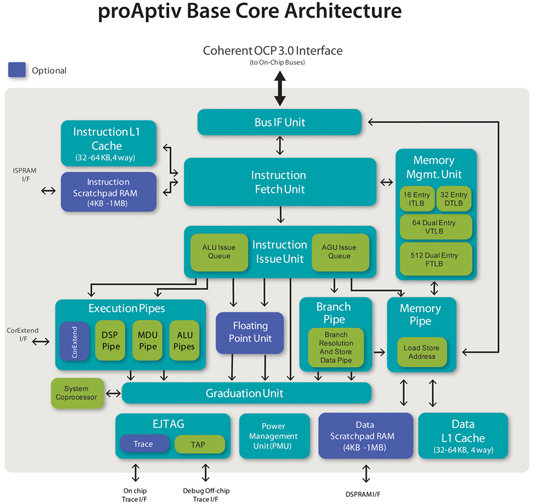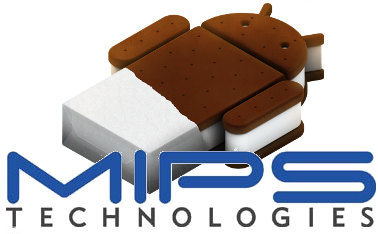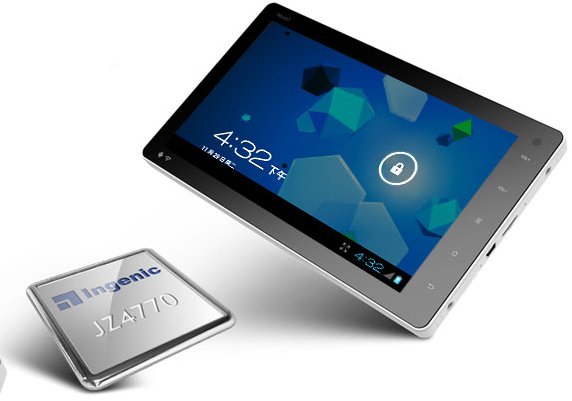MIPS and Microchip organize a promotion on a MIPS PIC32 MCU development Kit. The Microstick II delivers a development hardware platform for Microchips MIPS-based 32-bit microcontrollers. It’s USB-powered and includes an on-board debugger/programmer, a DUT socket for easy device swapping, a user LED and reset button. Key features: Integrated USB programmer / debugger – No external debugger required USB Powered – Ease of use, No external power required MPLAB support. DUT Socket – Flexible, Easy device replacement 0.025” Pin headers – Enables plug-in to Breadboard with room for jumper wires Easy access to all device signals for probing Small size – Smaller than a stick of gum at 20 x76mm – Easily Portable On board User LED and Reset Switch Free demo code Microstick II supports all 3.3V PIC24FJ, PIC24H, dsPIC33, and PIC32 SPDIP packaged devices which are included in the kit. Microkit II normally costs 34.95 USD, but is […]
MIPS Introduces microAptiv, interAptiv and proAptiv Cores
MIPS Technologies has introduced their new Aptiv generation of microprocessor cores divided into 3 families: proAptiv, interAptiv and microAptiv. proAptiv Core (equivalent to ARM Cortex A15 DMIPS/Mhz) The proAptiv core achieves a 4.4 CoreMark/MHz score which according to MIPS is the best score reported for any licensable IP core. It also achieves 3.5 DMIPS/MHz which is abnout the same performance as ARM Cortex A15. This core targeted at high performance applications such as smartphones, tablets, HD STB, automotive infotainment and residential gateways. proAptiv is recommended as an upgrade to MIPS32 74K/1074K cores. interAptiv Core (equivalent to ARM Cortex-R5 DMIPS/Mhz) The multi-threaded interAptiv core delivers higher CoreMark/MHz (3.2) than competing cores in similar die area and 1.7 DMIPS/MHz per core. The interAptiv is aimed at mid-range applications such as mainstream STB, digital cameras, mid-range smartphone, broadband CPE (Consumer Premise Equipment) and SATA/SSD controllers. microAptiv Core (equivalent to ARM Cortex-M3/M4 DMIPS/Mhz) The […]
Android NDK Revision 8 Adds MIPS Architecture Support
Google has just released Android Native Development Kit Revision 8, the Android SDK that allows developers to reuse C/C++ code. This version adds support for MIPS architecture and fixes a few bugs. Here’s the changelog of the new features and most important bug fixes: Added support for the MIPS ABI, which allows you to generate machine code that runs on compatible MIPS-based Android devices. Major features for MIPS include MIPS-specific toolchains, system headers, libraries and debugging support. For more details regarding MIPS support, see docs/CPU-MIPS.htmlin the NDK package. Fixed a typo in GAbi++ implementation. Fixed an issue in which make-standalone-toolchain.sh fails to copy libsupc++.*. You can download Android NDK version 8 to develop native apps for MIPS or take advantage of the new bug fixes. Previously, MIPS provided the Android NDK on their own website, but this version might be phased out, as MIPS support is now part of the […]
MIPS Releases Android NDK 7m
MIPS has just announced the release of the Android Native Development Kit version 7. It has the same APIs as the Android NDK revision 7 released in November 2011 (for Android 4.0), but adds support for MIPS architecture and the MIPS ABI . The NDK is available for Windows, Linux and MacOS. The NDK allows developers to use C/C++ code either to reuse existing C/C++ code or to improve the performance over code developed with Java. Note that MIPS states that “using native code does not result in an automatic performance increase, but always increases application complexity. If you have not run into any limitations using the Android framework APIs, you probably do not need the NDK.” The NDK can be downloaded for: Windows Linux Mac You’ll also have to download the Android MIPS SDK, if you want to use the NDK. Strangely, the Mac SDK is not available for […]
Android 4.0 Source Code For MIPS is Now Available
In the last few weeks, MIPS has already released the Linux Kernel for MIPS Android and shown us a low cost (99 USD) Android ICS Tablet. Today, they announced the official release of MIPS Android 4.0 source code. The latest version of Android 4.0 is “mr0″ and you can read the release notes for further details. Before downloading the Android source code be sure that you have a correctly setup Linux workstation. Now, here are the instructions to checkout MIPS Android 4.0:
|
1 2 3 4 |
mkdir mipsandroid cd mipsandroid repo init --repo-url=git://github.com/MIPS/repo.git --repo-branch=stable -u git://github.com/MIPS/manifests.git -b mips-ics-mr0 -m mips-ics-4.0.1_r1m1.xml repo sync |
The first time you run the repo sync it will download several gigabytes of source code to your machine so be patient and it may take a few hours. Once the download is completed future updates may take only a few minutes since only the code changes are downloaded. If you just want to have a look, All MIPS Android source code can also be viewed online at http://www.github.com/mips. […]
99 USD MIPS Android 4.0 Tablet Hands-on Video
Following the announcement of the 99 dollars Ainol Novo 7 Android ICS last week, MIPS’s Amit Rohatgi, Mobile Principal Architect at MIPS released a longer demo video of the device, showcasing the following: Angry Bird Game with framerate around 50 FPS. Kindle Reader Web Browser Rear & Front Camera Photo Gallery (transition are a little sluggish) Email (Exchange account) 1080p video playback both an the device and mirroring on HDTV via an HDMI cable He also explain that on of this friends could watch 3 full-length movies on a battery charge. Jean-Luc Aufranc (CNXSoft)Jean-Luc started CNX Software in 2010 as a part-time endeavor, before quitting his job as a software engineering manager, and starting to write daily news, and reviews full time later in 2011. www.cnx-software.com
99 USD Android 4.0 Tablet (Novo 7) Powered By MIPS Processor
MIPS has just announced the Novo 7 a low cost Android ICS tablet powered by Ingenic’s JZ4770 mobile applications processor that leverages a MIPS-BasedTM XBurstTM CPU running at 1GHz. The new tablet is available with a 7″ capacitive multi-touch screen. 8″ (Novo 8 ) and 9″ (Novo 9) form factors will be available soon. All versions include support for WiFi 802.11 b/g/n, USB 2.0, HDMI 1.3 and microSD, as well as 3D graphics with the Vivante GC860 GPU, 1080p video decoding and dual front/rear cameras (2 MPixel). The XBurst processor’s power-efficient architecture provides extended battery life-the 7″ tablet draws less than 400mA during active web browsing. The Ingenic JZ4770 SoC inside of this (ultra) low cost tablet is one of the first MIPS-based systems-on-chips (SoCs) targeted for mobile devices that delivers 1GHz+ frequency. The JZ4770 SoC is powered by a MIPS32 compatible XBurst CPU designed by Ingenic. The XBurst CPU […]
MIPS Releases Kernel 3.0.8, plans for Android 4.0
MIPS has just released Linux Kernel 3.0.8 port for MIPS SoC, the kernel version used by Android 4.0.1. The latest kernel is available on MIPS developer website at http://developer.mips.com/linux/. You can use Git to get the latest kernel source code for MIPS Technologies cores (with hardware fixes and improvements) as follows:
|
1 |
git clone git://git.linux-mips.org/pub/scm/linux-mti.git -b linux-mti-3.0.8 |
Although git is recommended to ensure you have the latest commit, you can also download a snapshot version from linux-mips FTP site.:
|
1 |
ftp://ftp.linux-mips.org/pub/linux/mips/mti-stable/v3.x/linux-mti-3.0.8-1.tar.bz2 |
Over the next several weeks, MIPS will be posting updates on the MIPS Developer website regarding Android 4.0 (ICS) with a release planned for mid-december 2011. Jean-Luc Aufranc (CNXSoft)Jean-Luc started CNX Software in 2010 as a part-time endeavor, before quitting his job as a software engineering manager, and starting to write daily news, and reviews full time later in 2011. www.cnx-software.com







